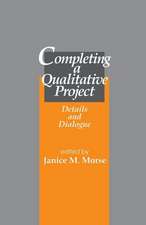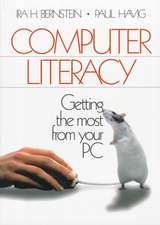A Journey Through Qualitative Research: From Design to Reporting
Autor Stéphanie Gaudet, Dominique Roberten Limba Engleză Hardback – 26 feb 2018
Encouraging students to think of qualitative research as a flexible, cyclical process rather than a linear one, this book offers a panoramic strategy and dynamic approach to qualitative research that accommodates the fluid nature of research and accounts for lessons learned through lived experience. With an emphasis on the analysis stage—within case, across case, and the dialogue between these insights and existing literature—it uses concrete applications to show how your methodological decisions translate into practice.
It covers:
- Forming, defending, and evaluating research questions
- Choosing a research approach
- Ensuring ethically sound research
- Collecting quality data
- Analyzing data in layers
- Reporting research results
| Toate formatele și edițiile | Preț | Express |
|---|---|---|
| Paperback (1) | 437.90 lei 6-8 săpt. | |
| SAGE Publications – 26 feb 2018 | 437.90 lei 6-8 săpt. | |
| Hardback (1) | 922.33 lei 6-8 săpt. | |
| SAGE Publications – 26 feb 2018 | 922.33 lei 6-8 săpt. |
Preț: 922.33 lei
Preț vechi: 1263.47 lei
-27% Nou
Puncte Express: 1383
Preț estimativ în valută:
176.50€ • 184.50$ • 149.15£
176.50€ • 184.50$ • 149.15£
Carte tipărită la comandă
Livrare economică 07-21 martie
Preluare comenzi: 021 569.72.76
Specificații
ISBN-13: 9781446267127
ISBN-10: 1446267121
Pagini: 264
Dimensiuni: 170 x 242 x 22 mm
Greutate: 0.61 kg
Ediția:First Edition
Editura: SAGE Publications
Colecția Sage Publications Ltd
Locul publicării:London, United Kingdom
ISBN-10: 1446267121
Pagini: 264
Dimensiuni: 170 x 242 x 22 mm
Greutate: 0.61 kg
Ediția:First Edition
Editura: SAGE Publications
Colecția Sage Publications Ltd
Locul publicării:London, United Kingdom
Recenzii
This book is a must for new researchers who want to succeed in qualitative inquiry.
The real coup de maître is the way the authors compare qualitative research to a palimpsest and subsequently sketch the phases of data analysis with suitable examples. Qualitative researchers…have a read!
This book goes significantly beyond "how to do research" and a recipe approach found in many textbooks. Rather it encourages engagement with "being" a researcher and uses project checklists to prompt reflexivity.
In this book Gaudet and Robert do a number of revealing things. First, they take the powerful metaphor of journey to help illuminate the process of inquiry. Second, they take key markers of quality and provide pointers to these ‘topographical features’ that help provide surety on the way. Following on, the authors make accessible key concepts and ideas and illustrate how they animate and reveal key decision-making points. Each of these key features build richer understandings and induct researchers new to qualitative inquiry in order to make a difference.
The most valuable sections are the three chapters on analysis of qualitative data, which go through two texts step by- step to give students a hands-on feel for a three-layer analysis that the authors imagine as a palimpsest – because ‘a new creation can arise from original materials that had been repeatedly deconstructed and reconstructed’. The texts chosen are engaging, and the close analysis is interesting
The real coup de maître is the way the authors compare qualitative research to a palimpsest and subsequently sketch the phases of data analysis with suitable examples. Qualitative researchers…have a read!
This book goes significantly beyond "how to do research" and a recipe approach found in many textbooks. Rather it encourages engagement with "being" a researcher and uses project checklists to prompt reflexivity.
In this book Gaudet and Robert do a number of revealing things. First, they take the powerful metaphor of journey to help illuminate the process of inquiry. Second, they take key markers of quality and provide pointers to these ‘topographical features’ that help provide surety on the way. Following on, the authors make accessible key concepts and ideas and illustrate how they animate and reveal key decision-making points. Each of these key features build richer understandings and induct researchers new to qualitative inquiry in order to make a difference.
The most valuable sections are the three chapters on analysis of qualitative data, which go through two texts step by- step to give students a hands-on feel for a three-layer analysis that the authors imagine as a palimpsest – because ‘a new creation can arise from original materials that had been repeatedly deconstructed and reconstructed’. The texts chosen are engaging, and the close analysis is interesting
Cuprins
Chapter 1: Choosing qualitative inquiry
The knowledge production process
Qualitative research design
Realm of qualitative epistemologies
Chapter 2: Designing an iterative research project
Designing the research
The writing of a research project
Chapter 3: Choosing an Approach to Guide Methodological Decisions
Phenomenology
Grounded theory
Discourse analysis
Narrative analysis
Ethnography
Chapter 4: Choosing Tools for Your Fieldwork
Observation
Interviews
Documents
Chapter 5: Ethical challenges in qualitative research
Procedural Ethics
Making an Application to the REB
Concerns at the Heart of Research Relationships
Chapter 6: Preparing for analysis and validity requirements
The palimpsest as a metaphor for principles of analysis
Vertical analysis: The first stratum of the palimpsest
Horizontal analysis: The second stratum of the palimpsest
Theoretical analysis: The third stratum of the palimpsest
Initial project
Chapter 7: Vertical Analysis
Contextualizing condensation
Semantic condensation
Chapter 8: Horizontal analysis
Horizontal analysis using discourse analysis through interpretative repertoires
Horizontal analysis using a mixed approached inspired by grounded theory and narrative analysis
Chapter 9: Theorizing and presenting the results
Classification by Typology
Bringing out contrasting characters
Establishing a dialogue to enrich concepts
Ensuring the quality of the study
The knowledge production process
Qualitative research design
Realm of qualitative epistemologies
Chapter 2: Designing an iterative research project
Designing the research
The writing of a research project
Chapter 3: Choosing an Approach to Guide Methodological Decisions
Phenomenology
Grounded theory
Discourse analysis
Narrative analysis
Ethnography
Chapter 4: Choosing Tools for Your Fieldwork
Observation
Interviews
Documents
Chapter 5: Ethical challenges in qualitative research
Procedural Ethics
Making an Application to the REB
Concerns at the Heart of Research Relationships
Chapter 6: Preparing for analysis and validity requirements
The palimpsest as a metaphor for principles of analysis
Vertical analysis: The first stratum of the palimpsest
Horizontal analysis: The second stratum of the palimpsest
Theoretical analysis: The third stratum of the palimpsest
Initial project
Chapter 7: Vertical Analysis
Contextualizing condensation
Semantic condensation
Chapter 8: Horizontal analysis
Horizontal analysis using discourse analysis through interpretative repertoires
Horizontal analysis using a mixed approached inspired by grounded theory and narrative analysis
Chapter 9: Theorizing and presenting the results
Classification by Typology
Bringing out contrasting characters
Establishing a dialogue to enrich concepts
Ensuring the quality of the study
Descriere
A hands-on, start-to-finish guide to qualitative research, showcasing the complexities and interrelationships of different methods and strategies, taking a flexible, cyclical view of research, rather than a linear one.
















